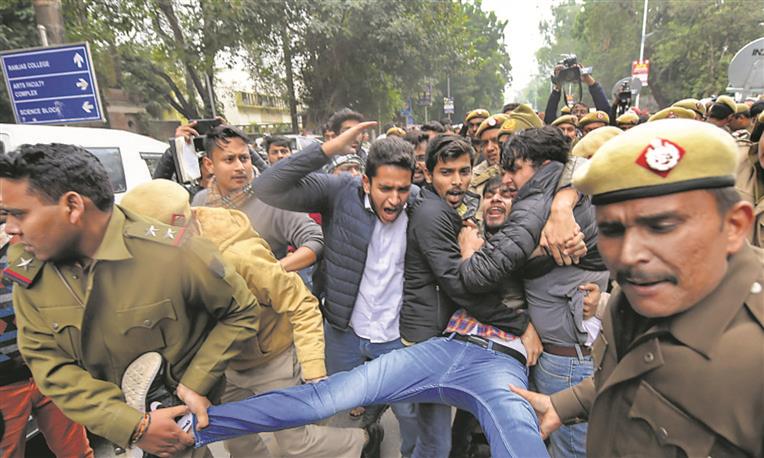
IRASCIBLE: Dealing brutally with a riotous crowd alienates the police from society.
MP Nathanael
MP Nathanael
Former IG, CRPF
AFTER the clash with lawyers on the Tis Hazari court premises in November, Delhi Police personnel received sympathy for themselves initially. But this wave of sympathy was short-lived. Within a few days, their brutality in dispersing the students of Jawaharlal Nehru University, who were protesting against the fee hike, came in for severe condemnation. While the students were fleeing from the spot to escape the lathicharge, the policemen chased and beat them up badly. Even the blind among them were not spared and became the targets of their ire.
In the recent protests against the Citizenship (Amendment) Act, the students of Jamia Millia Islamia had a taste of police brutality. Despite the protests by students being peaceful, they were beaten up merely because a few buses were burnt some distance away. Despite their denial, there is evidence that some rounds were fired by the policemen and two students were injured.
That the policemen barged into the library of the university and started thrashing the students was evident in the videos that went viral. Even the girls were not spared. Some of them received blows while attempting to shield their male colleagues, who too were badly beaten up. Firing tear gas was unwarranted and unacceptable. A post-graduate law student lost his eyesight due to the lathicharge. One student fractured his legs and another broke his hand. Several others suffered injuries.
Though police officials maintain that no permission of the Vice-Chancellor was required to enter the campus, when they were supposedly chasing criminals, the facts suggest otherwise. Barging into a library where students were studying and beating them up ruthlessly apart from vandalising the furniture and property in the library by the Delhi Police personnel speaks of poor leadership. The official under whose directions they entered the campus, and more particularly, the library, has to be taken to task. On the face of it, the policemen appeared to be a disorganised lot who went berserk after they were given a free hand to control the situation.
Maharashtra CM Uddhav Thackeray termed the police action in the university as ‘almost like the days of Jallianwala Bagh’, as students were targeted for exercising their constitutional right.
The situation has been no better in Aligarh Muslim University. A team of an NGO, Karwan-e-Mohabbat, led by Harsh Mander and John Dayal, that visited to look into police excesses, reported that the situation did not warrant the use of stun grenades and tear gas shells. The team has opined that the decision of the Vice-Chancellor to call in the police to disperse the students was ‘totally uncalled for’. The VC was ill-advised by the Registrar, an IPS officer. One of the students had his palm blown off as a stun grenade exploded in his hand.
The Rapid Action Force (RAF) led by its commandant Puneet Kauldhar successfully dispersed the students, but some of them, including the commandant himself, suffered injuries due to stone pelting. The RAF has the required skill and expertise to disperse mobs with the minimum of force. It has the added advantage of being familiar with the area in which they operate as they periodically visit it as part of their familiarisation exercise as part of responsibility.
That there was lack of intelligence about the possibility of miscreants attempting to exploit the protests is evident at Jamia. The police ought to have geared up their intelligence network soon after the Citizenship (Amendment) Bill was passed in Parliament. That could have prevented the situation from turning violent by taking timely remedial measures. Isolating the peaceful protesters from any possible intrusion of miscreants have helped.
Unfortunately, peaceful protests turned violent through provocation and attempts to forcibly evict the protesters. Rather than the protesters, it is the police that needs to exercise restraint in to trying to evict the protest site.
The Vice-Chancellor of Jamia stated that the university will lodge an FIR against police personnel who beat up the students on the campus. In a recent judgment, the Punjab and Haryana High Court asserted that policemen guilty of committing excesses and brutally beating up detainees cannot claim protection under Section 197 of the CrPC. A formal inquiry alone can bring out the truth and identify the culprits who exceeded their brief. How can anyone justify the beating up of a student mercilessly and swinging lathis in a way that could have even led to death.
The police image of being brutal in dealing with a riotous crowd and even criminals in custody has gained credence by their action against the protesters. While a few decades back, this may have been attributed to instilling a sense of fear among the criminals, not so any longer. On the other hand, such actions tend to alienate them from society, on whom they depend to a large extent for intelligence and information. While in the police training centres, stress is laid on the need to maintain cordial relations with the public for maintaining law and order, people get alienated because of the hostile attitude.
Lack of in-service training has an adverse impact on their psyche and brutality becomes second nature. Periodic in-service training coupled with briefings by senior officers can go a long way in improving their psychology. Long duty hours, with little respite, make them irascible, manifest in such riotous situations. Innocent, hapless victims become a target to vent their ire. Irregular meal timings due to long duty hours impacts their health and mental perception. That 940 police personnel committed suicide in five years, ending December 2018, indicates their mental state.
An intensive study is needed on the psyche of our policemen to work out solutions to ensure their mental and emotional well-being, so that they are an asset to society.
Join Whatsapp Channel of The Tribune for latest updates.




























